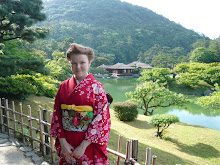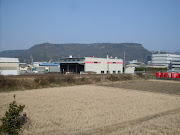Last night, I went out to an Indian restaurant for dinner with Andrew & Angela, and another American couple they work with. Just the idea of going out to Indian in Japan I found very novel. While we were there, Peter (other man) asked us all "What would you take back to America from Japan?". Answers were interesting- the garbage system* (see below), public baths, urban agriculture, the public transport system, Japanese people's hospitality & consideration for others. I think a couple of them may be going through some form of culture shock at the moment, so I think it was a smart question to ask.
"Let your vision be world embracing"
- Baha'u'llah
Culture Shock Phases
Andrew googled "culture shock" the other night, and was really interested by the different phases within it. I thought people might find them interesting (courtesy of Wikipedia as usual!):
1. Honeymoon Phase- Differences between old and new are seen in a romantic light. (eg love new foods, peoples habits)
2. Negotiation Phase- After about a few weeks, differences between old and new become more apparent, and may cause anxiety. (eg miss food from home, find people's habits annoying)
3. Adjustment Phase - After about 6-12 months, one becomes used to new culture and things become more "normal". Host country no longer feels "new", become concerned with basic living again.
4. Reverse Culture Shock - Produces same results as above, but is often unexpected and therefore can be more difficult than standard culture shock.
Types of "International People"
(Thank you Wikipedia!)
1. Rejectors - Can't integrate into new society and form ghettos. May be perceived as hostile by general community, return to home country seen as escape. Ironically, this type also struggles with re-integration the most when they return home. 60% of expatriates are like this.
2. Adopters - Completely take on host culture and lose original identity. Remain in host country forever. 10% of expatriates are like this.
3. Cosmopolitans - Adapt parts of host culture they like, while retaining aspects of original culture. Able to return home, or relocate elsewhere with few problems. 30% of expatriates are like this.
Prevention/Coping Tips
Scared? Here's some tips I found for the international adventurer.
* Learn about the country & culture before your trip. This way, culture is more familiar and one is more aware of differences & how to deal with them. (eg study the language, reading about country)
* Avoiding offence (this is v. useful in life generally) - Try not to be offended, or offend locals. When I feel offended by what someone says, I take a deep breath, then try to understand the reason why the person said it. 90% of the time it's not intended to be hurtful.
* Being open-minded about culture - Try not to think "Why do they do it like this? In Australia, ...". It's simply different.* Exercise, meditation, yoga etc are good ways of dealing with stress
* Socialise!
For other tips, see http://edweb.sdsu.edu/people/cGuanipa/cultshok.htm
Sonia
* In Japan, you have to divide your garbage into several categories - combustible, plastic, PET/aluminium, non-combustible, paper & cardboard. If I wasn't so lazy I might appreciate it more!














